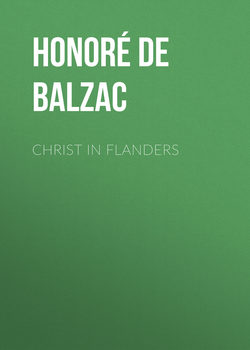Christ in Flanders

Реклама. ООО «ЛитРес», ИНН: 7719571260.
Оглавление
Honoré de Balzac. Christ in Flanders
CHRIST IN FLANDERS
Отрывок из книги
At a dimly remote period in the history of Brabant, communication between the Island of Cadzand and the Flemish coast was kept up by a boat which carried passengers from one shore to the other. Middelburg, the chief town in the island, destined to become so famous in the annals of Protestantism, at that time only numbered some two or three hundred hearths; and the prosperous town of Ostend was an obscure haven, a straggling village where pirates dwelt in security among the fishermen and the few poor merchants who lived in the place.
But though the town of Ostend consisted altogether of some score of houses and three hundred cottages, huts or hovels built of the driftwood of wrecked vessels, it nevertheless rejoiced in the possession of a governor, a garrison, a forked gibbet, a convent, and a burgomaster, in short, in all the institutions of an advanced civilization.
.....
The belated traveler glanced about him as he stepped on board, saw that there was no room for him in the stern, and went to the bows in quest of a seat. They were all poor people there. At first sight of the bareheaded man in the brown camlet coat and trunk-hose, and plain stiff linen collar, they noticed that he wore no ornaments, carried no cap nor bonnet in his hand, and had neither sword nor purse at his girdle, and one and all took him for a burgomaster sure of his authority, a worthy and kindly burgomaster like so many a Fleming of old times, whose homely features and characters have been immortalized by Flemish painters. The poorer passengers, therefore, received him with demonstrations of respect that provoked scornful tittering at the other end of the boat. An old soldier, inured to toil and hardship, gave up his place on the bench to the newcomer, and seated himself on the edge of the vessel, keeping his balance by planting his feet against one of those traverse beams, like the backbone of a fish, that hold the planks of a boat together. A young mother, who bore her baby in her arms, and seemed to belong to the working class in Ostend, moved aside to make room for the stranger. There was neither servility nor scorn in her manner of doing this; it was a simple sign of the goodwill by which the poor, who know by long experience the value of a service and the warmth that fellowship brings, give expression to the open-heartedness and the natural impulses of their souls; so artlessly do they reveal their good qualities and their defects. The stranger thanked her by a gesture full of gracious dignity, and took his place between the young mother and the old soldier. Immediately behind him sat a peasant and his son, a boy ten years of age. A beggar woman, old, wrinkled, and clad in rags, was crouching, with her almost empty wallet, on a great coil of rope that lay in the prow. One of the rowers, an old sailor, who had known her in the days of her beauty and prosperity, had let her come in "for the love of God," in the beautiful phrase that the common people use.
"Thank you kindly, Thomas," the old woman had said. "I will say two Paters and two Aves for you in my prayers to-night."
.....